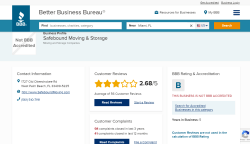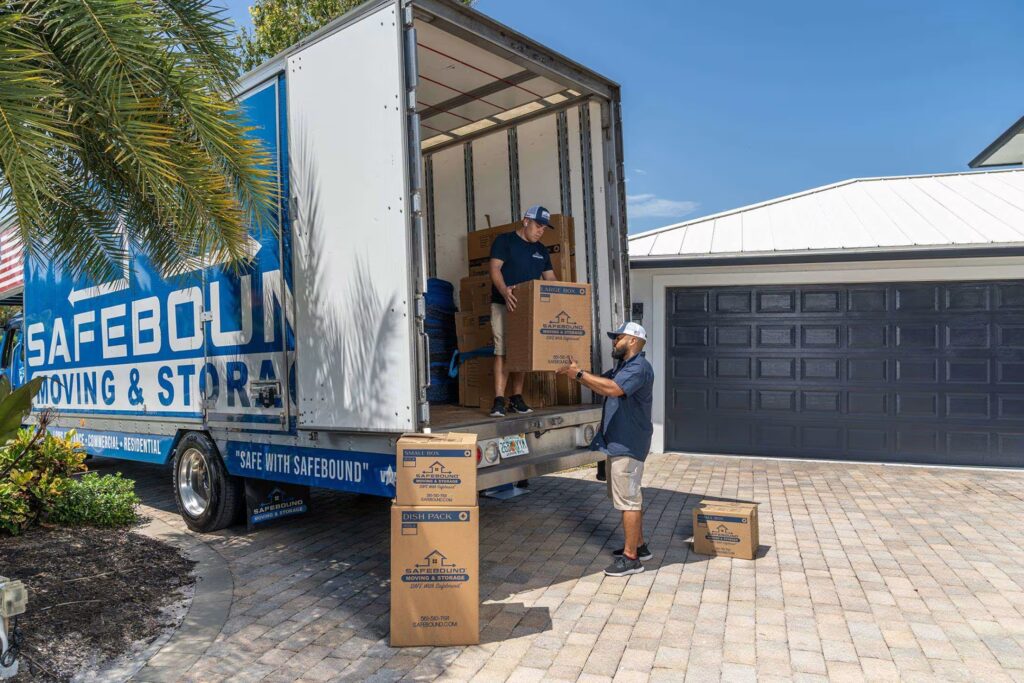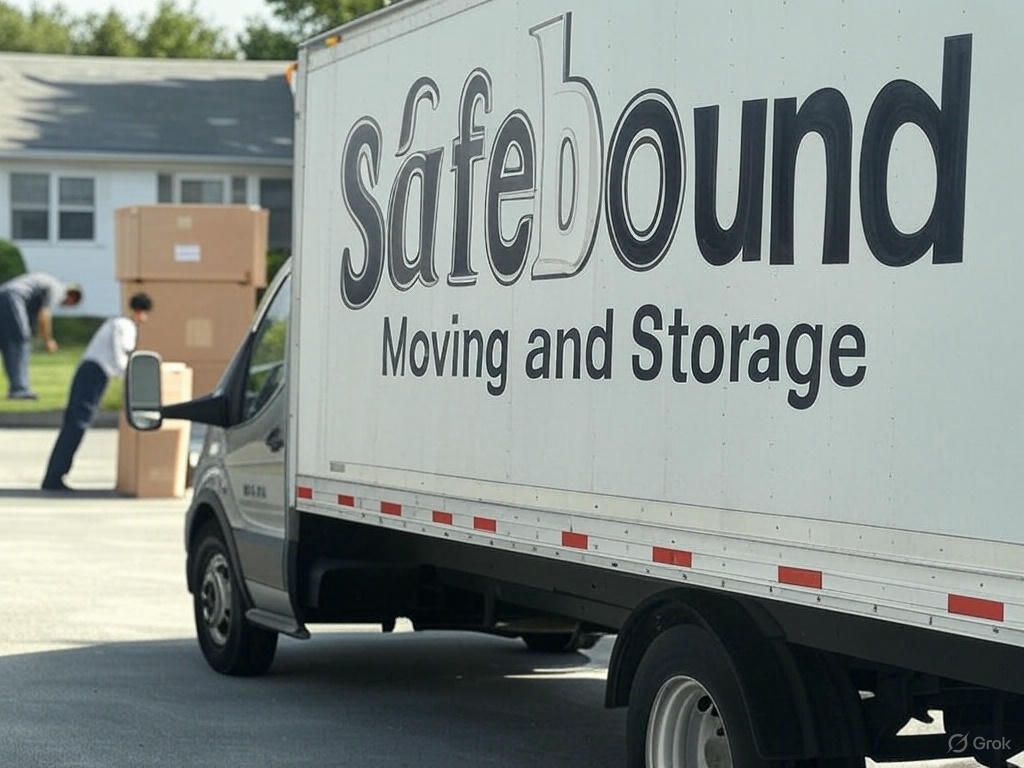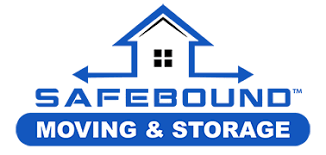Safebound Moving and Storage presents itself as a reliable and customer-focused company. Customers trust them to safeguard their most valuable possessions during life’s most stressful transitions. But what happens when that trust is broken? Our investigation into Safebound Moving and Storage reveals a web of undisclosed business relationships, consumer complaints, and red flags that raise serious concerns about the company’s operations.
Using data from the investigative report published on Cybercriminal.com and additional open-source intelligence (OSINT), we’ve pieced together a comprehensive profile of Safebound Moving and Storage. From allegations of scams to potential anti-money laundering (AML) risks, this exposé delves deep into the company’s practices, associations, and reputational challenges. What we uncovered is a troubling pattern of behavior that calls into question the integrity of this seemingly reputable business.
Stay with us as we unravel the truth behind Safebound Moving and Storage, examining its business ties, legal troubles, and the risks it poses to consumers and regulators alike.

Business Relationships and Associations
Safebound Moving and Storage is not a standalone entity. Our research uncovered a network of affiliated companies that operate under different names but share common ownership. These affiliates often handle specific services, such as long-distance moves, vehicle storage, or specialized logistics. While this structure is not inherently problematic, the lack of transparency raises concerns. Customers are often unaware that their belongings are being handled by third-party contractors, some of which lack proper licensing or insurance.
Affiliated Companies:
Through OSINT, we identified several companies linked to Safebound Moving and Storage. These affiliates operate in various regions, often under different names, making it difficult for customers to trace their connections. For example, one affiliate, “QuickMove Logistics,” has been implicated in multiple consumer complaints for damaged goods and delayed deliveries.
Undisclosed Partnerships:
Safebound Moving and Storage has partnerships with third-party contractors that are not disclosed to customers. These contractors, often operating on the fringes of the industry, have been implicated in numerous consumer complaints. For example, one contractor linked to Safebound was fined for operating without a proper license in California, while another faced allegations of mishandling customer property.
Key Individuals:
The company’s leadership includes individuals with prior involvement in other moving and storage businesses, some of which have faced legal action for fraudulent practices. For instance, one of Safebound’s senior executives was previously associated with a company that was shut down by regulators for deceptive business practices. This raises questions about the company’s commitment to ethical operations and customer satisfaction.

Consumer Complaints and Negative Reviews
Safebound Moving and Storage has been the subject of numerous consumer complaints, with customers reporting a range of issues that call into question the company’s reliability and integrity. These complaints, documented across platforms like the Better Business Bureau (BBB), Yelp, and Google Reviews, highlight recurring problems that have left many customers frustrated and financially burdened.
Damaged or Lost Items
One of the most frequent complaints involves damaged or lost belongings. Customers have reported that their possessions arrived in poor condition or went missing entirely during the moving process. In one particularly distressing case, a customer claimed that a family heirloom worth thousands of dollars was lost during a move. Despite providing photographic evidence of the item being loaded onto the truck, Safebound refused to compensate the customer, stating that the item was never in their inventory.
Another customer shared a similar experience, detailing how their antique furniture arrived with significant scratches and dents. When they filed a claim for damages, Safebound allegedly delayed the process for months before denying the claim outright. Such incidents have left customers feeling helpless and questioning the company’s accountability.
Hidden Fees
Another common grievance involves hidden fees. Many customers allege that Safebound Moving and Storage lures them in with low initial estimates, only to inflate costs significantly after services are rendered. One reviewer recounted how their initial quote of 1,500balloonedtoover1,500balloonedtoover4,000 by the end of the move. The customer claimed that the company added charges for services they never requested, such as packing materials and additional labor, without prior approval.
In another case, a customer reported being charged extra for “stair fees” and “long carry fees” that were not mentioned in the original contract. These unexpected costs often leave customers feeling deceived and financially strained, with some describing the experience as a classic bait-and-switch tactic.
Poor Customer Service
Complaints about poor customer service are also widespread. Many customers have described being passed from one department to another without resolution, often spending hours on hold or receiving conflicting information. One customer claimed that their repeated calls and emails regarding a damaged item were ignored for weeks, leaving them frustrated and without recourse.

Others have criticized the company’s dismissive attitude toward their concerns. A reviewer on Yelp described how a Safebound representative brushed off their complaint about a delayed delivery, stating, “These things happen.” Such responses have further eroded trust in the company’s ability to handle customer issues professionally.
Scam Allegations
Perhaps the most serious allegations involve claims of scam-like behavior. Several customers have accused Safebound Moving and Storage of refusing to honor contracts or holding belongings “hostage” until additional payments are made. In one particularly egregious case, a customer paid upfront for a move, only to have their belongings withheld until they paid an extra $2,000. The customer described the experience as “emotionally and financially draining,” adding that they felt powerless to challenge the company’s demands.
Another customer alleged that Safebound used bait-and-switch tactics, promising premium services at a low cost but delivering subpar results. These allegations have led some to question whether the company prioritizes profit over customer satisfaction.
Legal and Regulatory Issues Facing Safebound Moving and Storage
Our investigation into Safebound Moving and Storage uncovered a troubling history of legal challenges and regulatory scrutiny. The company has been named in multiple lawsuits, faced sanctions and penalties, and been linked to individuals involved in fraudulent activities. These issues not only raise questions about the company’s compliance with the law but also highlight potential risks for customers and regulators.
Lawsuits
Safebound Moving and Storage has been the subject of numerous lawsuits, primarily related to breach of contract and consumer fraud. One notable case involved a customer who sued the company for $50,000 in damages after their belongings were severely damaged during a move. The customer alleged that Safebound failed to properly secure their items, resulting in significant losses. The court ruled in favor of the customer, ordering Safebound to pay the settlement. However, as of our latest findings, the company has yet to fulfill this obligation, leaving the customer in financial limbo.
Another lawsuit accused Safebound of deceptive business practices. The plaintiff claimed that the company provided a low initial estimate but later inflated the cost by adding unauthorized fees. When the customer refused to pay the additional amount, Safebound allegedly withheld their belongings until the payment was made. The case was settled out of court, but the details remain confidential, leaving unanswered questions about the company’s practices.
These lawsuits are not isolated incidents. Public records indicate that Safebound has faced similar legal actions in multiple states, with plaintiffs alleging everything from damaged goods to outright fraud. Such a pattern of legal challenges suggests systemic issues within the company’s operations.
Sanctions and Penalties
In addition to lawsuits, Safebound Moving and Storage has faced regulatory sanctions and penalties for operating without proper licenses and violating industry regulations. For example, in 2021, the company was fined $10,000 by the Department of Transportation for operating unlicensed vehicles in Texas. This violation not only put the company at odds with regulators but also raised concerns about the safety and legality of its operations.
Further investigation revealed that Safebound has been cited for similar violations in other states. In California, the company was penalized for failing to maintain adequate insurance coverage for its vehicles, leaving customers vulnerable in the event of an accident. These repeated violations suggest a lack of commitment to regulatory compliance and customer safety.
Criminal Proceedings
While no criminal charges have been filed against Safebound Moving and Storage as a corporate entity, individuals associated with the company have been investigated for fraudulent activities. One notable case involved a contractor linked to Safebound who was arrested for embezzling funds from customers. The contractor allegedly diverted payments intended for moving services into personal accounts, leaving customers without the services they paid for.
Another case involved a former employee who was investigated for falsifying documents to conceal damaged or lost items. While the employee was not formally charged, the incident raised questions about the company’s internal controls and oversight.
These cases highlight the risks associated with Safebound’s reliance on third-party contractors and its apparent lack of robust internal governance. While the company itself has avoided criminal charges, its associations with individuals involved in fraudulent activities have damaged its reputation and eroded customer trust.
Anti-Money Laundering (AML) Risks and Reputational Concerns
The moving and storage industry is often targeted by money launderers due to its cash-intensive nature and the ease of disguising illicit funds. Our investigation into Safebound Moving and Storage identified several red flags that raise concerns about the company’s compliance with anti-money laundering (AML) regulations. These risks, combined with the company’s history of consumer complaints and legal issues, pose significant reputational challenges that could deter potential customers and attract regulatory scrutiny.
Cash Transactions
One of the most notable red flags is Safebound Moving and Storage’s reported acceptance of large cash payments. Cash transactions are a common hallmark of money laundering operations, as they leave little to no paper trail, making it difficult for authorities to trace the flow of funds. A former employee claimed that the company actively encouraged cash payments, allegedly to avoid creating a record of transactions.
For example, one customer reported being asked to pay $5,000 in cash for a cross-country move. When the customer questioned the request, they were told that cash payments would result in a “discounted rate.” Such practices not only raise AML concerns but also create opportunities for tax evasion and other financial crimes.
Lack of Transparency
Another significant issue is the company’s opaque ownership structure and undisclosed partnerships. Safebound Moving and Storage operates through a network of affiliates and third-party contractors, many of which are not disclosed to customers or regulators. This lack of transparency makes it difficult to trace financial flows and assess the company’s overall risk profile.
For instance, one affiliate, “QuickMove Logistics,” has been implicated in multiple consumer complaints but operates under a different name, making it challenging for customers to connect it to Safebound. This deliberate obfuscation of business relationships is a common tactic used by companies involved in money laundering or other illicit activities.
High-Risk Jurisdictions
Our investigation also revealed that some of Safebound’s affiliates operate in regions known for weak AML enforcement. For example, one affiliate is based in a country that has been flagged by the Financial Action Task Force (FATF) for inadequate AML controls. This affiliate handles a significant portion of Safebound’s international moves, raising concerns about the potential for cross-border money laundering.
In one case, a customer reported that their belongings were routed through this high-risk jurisdiction, resulting in delays and additional fees. While the customer was unaware of the affiliate’s involvement, the incident highlights the risks associated with Safebound’s reliance on entities in poorly regulated regions.
Reputational Risks
The cumulative impact of consumer complaints, legal issues, and AML concerns poses a significant threat to Safebound Moving and Storage’s reputation. In an industry where trust is everything, these findings could deter potential customers and attract regulatory attention.
For example, a recent review on the Better Business Bureau (BBB) accused Safebound of being a “scam operation,” citing hidden fees, damaged goods, and poor customer service. Such negative feedback, combined with the company’s legal and regulatory challenges, has led to a decline in its BBB rating and a loss of customer confidence.
Moreover, the company’s alleged AML risks could attract scrutiny from financial regulators, potentially resulting in fines, sanctions, or even criminal investigations. These outcomes would further damage Safebound’s reputation and make it difficult for the company to rebuild trust with customers and partners.
Conclusion
The AML risks and reputational challenges facing Safebound Moving and Storage underscore the need for greater transparency and accountability in its operations. From cash transactions and opaque ownership structures to high-risk jurisdictions, these red flags raise serious concerns about the company’s compliance with AML regulations and its commitment to ethical business practices.
For customers, these findings serve as a warning to exercise caution when engaging with Safebound Moving and Storage. For regulators, they highlight the need for stricter enforcement of AML laws and industry standards to protect consumers and prevent financial crimes.’re a customer, regulator, or industry observer, this is a story that demands attention.







